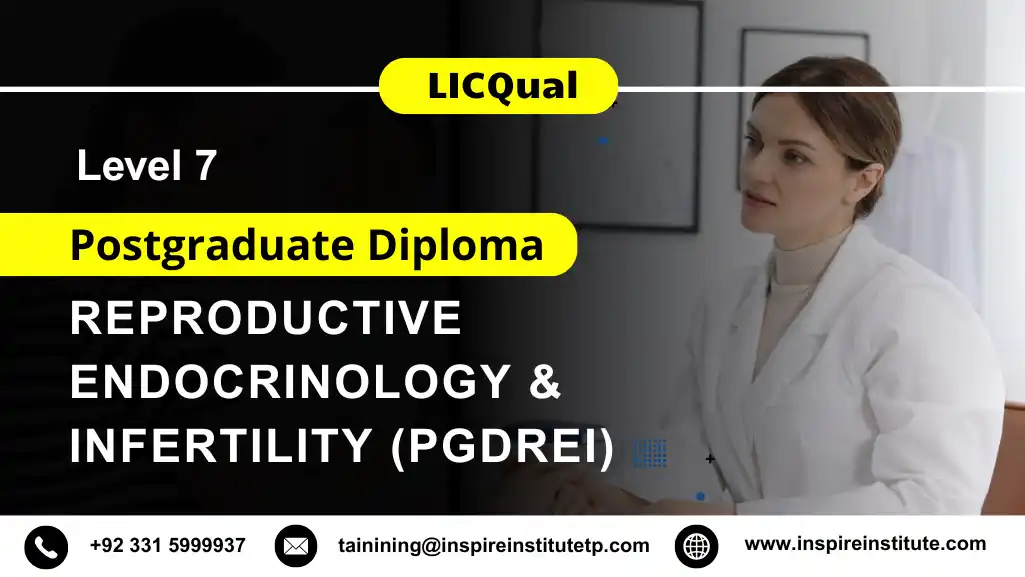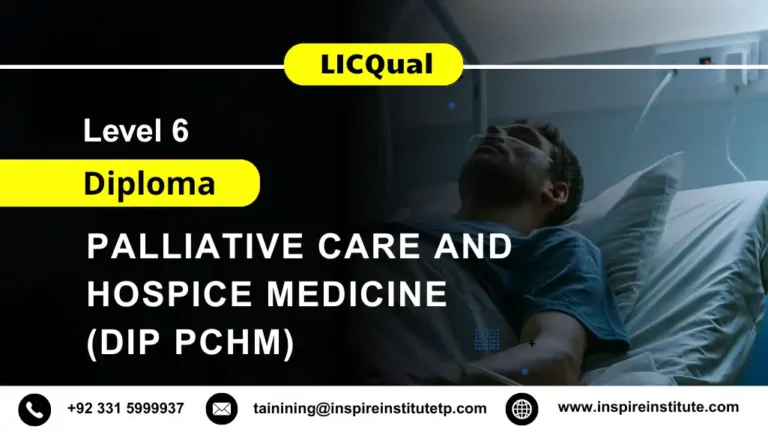LICQual Level 7 Postgraduate Diploma in Reproductive Endocrinology and Infertility (PgDREI)
The LICQual Level 7 Postgraduate Diploma in Reproductive Endocrinology and Infertility (PgDREI) is a highly advanced qualification designed for medical professionals and healthcare practitioners aiming to specialize in the diagnosis, management, and treatment of infertility and hormonal disorders. As infertility rates continue to rise globally, the demand for skilled reproductive endocrinologists and fertility specialists has significantly increased, making this postgraduate diploma an essential credential for those seeking expertise in this evolving field.
The PgDREI course provides an in-depth understanding of the complex interactions between hormones and the reproductive system. Learners explore advanced topics such as reproductive endocrinology, ovarian and testicular function, fertility preservation, and assisted reproductive technologies (ART) including IVF, ICSI, and embryo transfer. This comprehensive program blends scientific theory with clinical application, ensuring participants gain a robust foundation in the mechanisms that govern fertility and reproductive health. Through the integration of medical science and practical methodologies, this course prepares learners to address the growing challenges of infertility with evidence-based solutions.
The LICQual Level 7 Postgraduate Diploma in Reproductive Endocrinology and Infertility also focuses on developing analytical, diagnostic, and research skills essential for modern fertility specialists. Participants gain proficiency in hormonal assays, semen analysis, ovulation monitoring, and ultrasound diagnostics—skills that are fundamental for identifying and managing reproductive disorders. The curriculum emphasizes critical thinking and ethical decision-making in fertility management, enabling learners to offer compassionate and individualized care to patients dealing with infertility.
Why Choose this Qualification
The LICQual Level 7 Postgraduate Diploma in Reproductive Endocrinology and Infertility (PgDREI) is a globally recognized and career-defining qualification tailored for medical and healthcare professionals who aspire to become experts in reproductive medicine and infertility management. This advanced diploma provides a comprehensive understanding of reproductive endocrinology, hormonal function, and assisted reproductive technologies (ART).
Key Reasons to Choose this Qualification
1. Comprehensive Knowledge of Reproductive Endocrinology
- Gain an in-depth understanding of the hormonal mechanisms that regulate human reproduction and fertility.
- Learn the pathophysiology of reproductive disorders in both males and females.
- Study advanced reproductive endocrinology principles, including ovarian stimulation and luteal phase support.
- Explore the latest developments in fertility preservation and reproductive genetics.
- Develop strong academic foundations essential for clinical and research excellence.
2. Expertise in Infertility Diagnosis and Management
- Acquire diagnostic skills for evaluating male and female infertility cases effectively.
- Master the use of hormonal assays, semen analysis, and ovulation tracking techniques.
- Learn to develop personalized fertility treatment plans based on clinical findings.
- Gain exposure to advanced diagnostic imaging and ultrasound techniques.
- Understand the ethical and psychological dimensions of infertility management.
3. Advanced Training in Assisted Reproductive Technologies (ART)
- Receive hands-on experience in IVF, ICSI, and embryo culture laboratory practices.
- Understand cryopreservation methods for gametes and embryos.
- Learn quality control and quality assurance standards in ART laboratories.
- Gain expertise in embryo transfer, fertilization techniques, and reproductive genetics.
- Develop skills to optimize success rates in fertility treatment centers.
4. Research and Evidence-Based Clinical Practice
- Strengthen research skills through analytical and evidence-based learning.
- Learn to critically evaluate fertility studies and clinical data.
- Engage in project-based assessments that encourage scientific inquiry.
- Gain the ability to integrate research findings into daily clinical practice.
- Contribute to innovation and development in reproductive medicine.
5. Professional and Global Recognition
- Earn a UK-accredited Level 7 Postgraduate Diploma recognized by international healthcare institutions.
- Enhance your professional credibility and employability in reproductive health sectors.
- Meet global competency standards for fertility and endocrinology professionals.
- Increase career opportunities in hospitals, fertility clinics, and research centers.
- Establish a foundation for further postgraduate or doctoral studies in reproductive medicine.
6. Development of Leadership and Clinical Decision-Making Skills
- Learn to manage multidisciplinary teams in fertility and endocrinology clinics.
- Strengthen problem-solving and ethical decision-making capabilities.
- Gain skills in patient communication, counseling, and empathetic care.
- Develop leadership qualities essential for senior clinical and academic roles.
- Apply strategic planning and management techniques in healthcare settings.
7. Practical, Application-Oriented Learning
- Participate in real-world case studies and clinical simulations.
- Apply theoretical knowledge in fertility treatment and ART laboratory environments.
- Engage in continuous professional development through interactive workshops.
- Receive mentorship from experienced fertility specialists and endocrinologists.
- Translate classroom learning into clinical expertise and patient-centered practice.
8. Pathway to Career Advancement and Specialization
- Prepare for specialized roles such as Reproductive Endocrinologist, Fertility Consultant, or IVF Laboratory Director.
- Access opportunities for academic teaching, clinical supervision, and medical research.
- Strengthen your portfolio with a globally valued postgraduate credential.
- Build a strong foundation for leadership in reproductive healthcare policy and innovation.
- Gain lifelong access to professional development and alumni support networks.
The LICQual Level 7 Postgraduate Diploma in Reproductive Endocrinology and Infertility (PgDREI) means investing in a qualification that blends scientific depth with clinical precision. This program empowers learners with the expertise to address global reproductive health challenges and deliver effective, ethical, and innovative infertility solutions. By completing this course, you will not only elevate your professional standing but also contribute meaningfully to advancing reproductive healthcare and improving the quality of life for patients around the world.
Course Overview
LICQual UK Awarding Body
Average Completion Time:
6-24 Months
Study Units: 6 Units
Evidence & Assignment Based
Mandatory Units
Who Should Take This Course
The LICQual Level 7 Postgraduate Diploma in Reproductive Endocrinology and Infertility (PgDREI) is a prestigious qualification crafted for medical and healthcare professionals who aspire to deepen their knowledge and expertise in reproductive health and infertility management. This program provides an advanced academic and clinical foundation for individuals dedicated to improving fertility outcomes and advancing the science of reproductive endocrinology. Whether you are an experienced practitioner or a healthcare graduate aiming to specialize in fertility medicine, this qualification opens doors to advanced roles in clinical, research, and academic environments.
This Course is Suitable For
1. Medical Doctors and Physicians
- Perfect for general practitioners, gynecologists, and obstetricians seeking to specialize in reproductive endocrinology and infertility management.
- Enhances diagnostic and treatment planning skills for complex infertility cases.
- Develops the ability to design personalized fertility care strategies for diverse patient needs.
- Offers training in advanced hormonal therapies and assisted reproductive technologies (ART).
- Prepares doctors to deliver ethical, evidence-based care in fertility and endocrinology clinics.
2. Fertility Specialists and Reproductive Health Experts
- Designed for professionals working in fertility and reproductive medicine who want to formalize and expand their expertise.
- Provides in-depth knowledge of hormonal functions, reproductive anatomy, and ART innovations.
- Builds advanced clinical competencies in IVF, ICSI, and embryo culture management.
- Develops the capacity to improve patient outcomes through precise diagnostic and treatment techniques.
- Enhances leadership and management skills within fertility healthcare settings.
3. Biomedical Scientists and Laboratory Technologists
- Suitable for laboratory professionals engaged in reproductive diagnostics, hormonal assays, or embryology.
- Strengthens laboratory skills in semen analysis, hormonal testing, and gamete handling.
- Improves understanding of quality assurance and safety standards in reproductive laboratories.
- Equips learners with the ability to interpret lab data for accurate clinical diagnosis.
- Encourages professional advancement in clinical research and laboratory management roles.
4. Nurses and Midwives
- Ideal for nurses and midwives aspiring to work in fertility clinics or reproductive health departments.
- Provides a solid understanding of reproductive endocrinology and infertility management.
- Enhances patient care and counseling skills for individuals undergoing fertility treatment.
- Equips learners with knowledge in hormonal cycle tracking and fertility medication administration.
- Strengthens the ability to support multidisciplinary fertility care teams.
5. Clinical Researchers and Academicians
- Perfect for researchers and educators seeking to advance their knowledge in reproductive health and infertility science.
- Develops analytical skills for designing and conducting fertility-related studies.
- Provides opportunities for research publication and academic contributions.
- Encourages innovation in reproductive medicine through evidence-based investigation.
- Establishes a strong foundation for PhD-level or higher academic pursuits.
6. Public Health and Reproductive Health Policy Professionals
- Suitable for individuals working in health policy, fertility awareness programs, or public health sectors.
- Builds expertise in global reproductive health trends and fertility management initiatives.
- Develops policy-making skills to promote ethical and accessible fertility care.
- Equips learners to design and implement community fertility education programs.
- Strengthens data interpretation and program evaluation abilities in reproductive health projects.
7. Pharmacists and Clinical Pharmacologists
- Tailored for pharmacists working with reproductive endocrinology medications and hormonal therapies.
- Provides in-depth understanding of pharmacological protocols for infertility treatments.
- Strengthens skills in medication management, drug safety, and patient guidance.
- Encourages collaborative practice between pharmacists and fertility specialists.
- Enhances competence in designing hormonal therapy regimens aligned with ART procedures.
8. Graduates Aspiring for a Career in Reproductive Medicine
- Ideal for graduates in biomedical, biological, or health sciences aiming to enter the fertility sector.
- Provides postgraduate-level academic grounding in endocrinology and infertility.
- Develops technical and theoretical understanding of reproductive biology and ART techniques.
- Prepares learners for roles in clinical research, laboratory work, or fertility counseling.
- Strengthens employability and global career prospects in reproductive medicine.
Conclusion
The LICQual Level 7 Postgraduate Diploma in Reproductive Endocrinology and Infertility (PgDREI) is a transformative program for professionals and graduates who aspire to excel in the field of reproductive healthcare. By blending clinical expertise, laboratory proficiency, and scientific research, this qualification prepares learners to contribute meaningfully to advancements in infertility treatment and reproductive science. Whether your goal is to lead in fertility clinics, engage in academic research, or influence reproductive health policy, this program equips you with the knowledge, skills, and global recognition to make a lasting impact in the world of reproductive endocrinology and infertility management.
Course Benefits
The LICQual Level 7 Postgraduate Diploma in Reproductive Endocrinology and Infertility (PgDREI) is a UK-accredited qualification designed for medical practitioners, gynaecologists, endocrinologists, and healthcare professionals seeking to advance their expertise in reproductive medicine, hormonal balance, and infertility management. This comprehensive, assignment-based postgraduate diploma blends theoretical understanding with clinical practice, preparing learners to provide effective, evidence-based reproductive care and fertility treatments. Through flexible study options and research-driven assessments, this qualification empowers professionals to enhance patient outcomes and contribute to innovation in reproductive endocrinology and fertility medicine.
Key Benefits of the Course
- Specialist Knowledge
- Learners gain a deep understanding of reproductive anatomy, physiology, and endocrinology, with emphasis on hormonal regulation, ovulation, and fertility processes. The course explores male and female infertility, diagnostic approaches, and therapeutic interventions. It covers assisted reproductive technologies such as IVF, ICSI, and ovulation induction while addressing the pharmacology of reproductive hormones and fertility medications. Students also study the ethical, legal, and psychosocial dimensions of reproductive health and infertility treatment, ensuring a holistic approach to patient care.
- Practical Application
- The qualification focuses on developing practical skills through clinical simulations, case analyses, and applied assignments. Learners engage in diagnostic assessments for hormonal disorders and infertility, create treatment protocols, and practice effective patient consultations and counselling techniques. The course encourages collaboration within multidisciplinary fertility and endocrinology teams to enhance patient outcomes, safety, and care quality.
- Recognised Qualification
- This postgraduate diploma holds UK accreditation, affirming its credibility and alignment with global healthcare standards. Graduates earn an internationally recognised credential that validates their clinical expertise and professional competence. The qualification enhances career recognition, employability, and global mobility, positioning practitioners as trusted experts in reproductive endocrinology and infertility care.
- Flexible Learning Pathway
- Designed to accommodate the schedules of working professionals, the course follows an assignment-based format that supports self-paced learning. Participants can balance their professional commitments while accessing structured learning resources, expert mentorship, and interactive online sessions. This flexible pathway ensures academic excellence without compromising clinical responsibilities.
- Evidence-Based Training
- Learners engage with the latest scientific research, clinical studies, and international fertility guidelines to develop evidence-based decision-making skills. The programme emphasises critical evaluation of reproductive hormone data, application of validated treatment methods, and adherence to global standards of patient safety and care. Continuous updates on emerging technologies, reproductive genetics, and assisted conception methods ensure practitioners remain at the forefront of the field.
- Career Development
- The diploma opens diverse career pathways in fertility clinics, hospitals, research institutions, and academic settings. Graduates can pursue roles such as Reproductive Endocrinologist, Fertility Specialist, Clinical Educator, or Consultant. The course also equips professionals with leadership and management skills for overseeing fertility centres, advancing research, and shaping policy in reproductive medicine.
- Enhanced Patient Impact
- Graduates are trained to deliver ethical, compassionate, and patient-centred reproductive care. They develop the ability to manage infertility cases with sensitivity and cultural awareness, promoting emotional wellbeing and patient confidence. The programme encourages practitioners to adopt sustainable and evidence-based practices that improve patient outcomes and satisfaction.
- Professional Growth
- Participants strengthen critical thinking, diagnostic reasoning, leadership, and communication skills. The qualification fosters continuous professional development through reflective practice and interdisciplinary collaboration. Graduates gain the confidence to manage complex endocrine and reproductive cases independently, positioning themselves as leaders and innovators in the global field of reproductive medicine.
The LICQual Level 7 Postgraduate Diploma in Reproductive Endocrinology and Infertility (PgDREI) equips healthcare professionals with advanced scientific knowledge, clinical competence, and international recognition. It empowers graduates to deliver exceptional reproductive healthcare, contribute to medical advancements, and drive excellence in fertility and endocrinology practice worldwide.
Eligibility Criteria
The LICQual Level 7 Postgraduate Diploma in Reproductive Endocrinology and Infertility (PgDREI) is a UK-accredited qualification designed for medical professionals, gynaecologists, endocrinologists, and healthcare practitioners seeking to advance their expertise in reproductive medicine, hormonal balance, and infertility management. This assignment-based postgraduate diploma combines theoretical knowledge with clinical application, preparing learners to assess, diagnose, and manage complex reproductive and infertility cases effectively and ethically.
Educational Background
Applicants should hold a recognised medical qualification such as an MBBS, BDS, or equivalent degree. Registered healthcare professionals, including physicians, gynaecologists, nurses, and allied health practitioners with relevant experience in reproductive or fertility medicine, are also eligible to apply. Candidates holding international medical degrees will be assessed individually to ensure equivalence with UK academic and clinical standards.
Professional Experience
A minimum of one year of experience in clinical practice, reproductive medicine, gynaecology, or endocrinology is recommended. Prior exposure to fertility assessment, patient counselling, or hormonal therapy is advantageous. However, motivated practitioners with a keen interest in reproductive endocrinology and infertility, even without extensive prior experience, are encouraged to apply.
Age Requirement
Applicants must be at least 21 years old at the time of enrolment. This ensures that learners possess the professional maturity, ethical awareness, and responsibility required for postgraduate-level study and clinical practice in reproductive endocrinology and infertility care.
Language Proficiency
As the programme is delivered entirely in English, applicants must demonstrate competence in reading, writing, and verbal communication. Non-native English speakers should possess a minimum IELTS score of 6.0 or an equivalent qualification to effectively engage in academic writing, case discussions, and clinical documentation.
Technical Requirements
Learners are expected to have access to a computer or laptop with a reliable internet connection to participate in online learning, access course resources, and submit assignments. Basic computer literacy, including the ability to conduct research, analyse data, and prepare reports, is essential for successful completion of the programme.
Required Documents
Applicants must provide the following documents during the registration process:
A valid passport or national ID card for identity verification.
Certified copies of academic transcripts and previous qualifications.
Proof of professional registration or clinical experience in medicine, gynaecology, endocrinology, or allied healthcare (if applicable).
The Qualification Process
LICQual Level 7 Postgraduate Diploma in Reproductive Endocrinology and Infertility (PgDREI) follows a structured pathway to ensure learners gain comprehensive knowledge, practical skills, and professional competence in community oral healthcare.
Step 1: Self-Assessment
Learners review the entry requirements to confirm eligibility. Candidates with a background in dentistry, oral health, or public health are encouraged to apply.
Step 2: Registration
Complete the registration process by submitting required documents such as proof of qualifications, a valid ID, and payment of enrollment fees.
Step 3: Induction
An induction session is conducted to:
- Verify learner eligibility and documentation.
- Introduce study materials, learning outcomes, and assessment procedures.
Step 4: Learning and Evidence Submission
Learners complete assignments, case studies, and practical exercises demonstrating competence in public health dentistry, community oral health assessment, preventive strategies, and program planning.
Step 5: Feedback and Revision
Assessors review submitted evidence and provide constructive feedback. Learners can revise and resubmit work to meet all required standards.
Step 6: Competence Validation
Final submissions are evaluated to confirm that learners have met all theoretical and practical learning outcomes.
Step 7: Internal Quality Assurance (IQA)
The IQA team reviews the assessment process to ensure accuracy, fairness, and compliance with international standards.
Step 8: External Verification (EQA)
External verifiers validate the authenticity and quality of learner achievements.
Step 9: Certification
Upon successful verification, learners are awarded LICQual Level 7 Postgraduate Diploma in Reproductive Endocrinology and Infertility (PgDREI), demonstrating advanced proficiency in community oral healthcare and preparing them for professional growth in dental public health, preventive dentistry, and healthcare policy.







